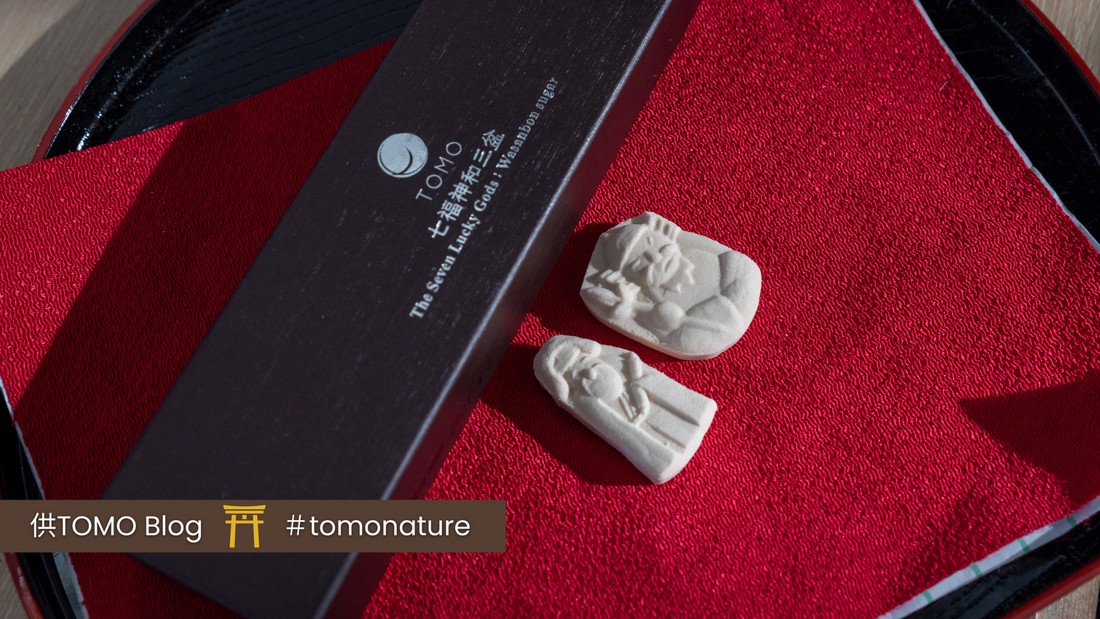
Japan is known for its rich cuisine, landscapes, and culture. If you are living in Japan or if you are visiting the country, you might be surprised by the harmony between Buddhism, Shinto, and traditional beliefs. The Seven Lucky Gods, also called Shichifukujin, are a perfect example. You will find them worshiped in Japanese temples and shrines, they are represented in artworks and popular culture.
Each god of the group is worshiped for a specific reason, but the Seven Lucky Gods as a collective is often depicted in Japanese art, especially in Netsuke (Japanese miniature sculptures), paintings and theater. Today, you can even find Seven Lucky Gods shaped wasanbon sugars and more!
Even if they are described as a group, each of the Seven Lucky Gods has its origin and specificities. In this article, you will discover their origin, why they are worshiped, how to do the pilgrimage, and where to get your own Seven Lucky Gods.

What are the origins of the Seven Lucky Gods in Japan?
This collective is born from Buddhism, Hinduism, and Japanese folklore. Each deity has its origin and individual characteristics (visually and regarding the reason why they are worshiped).

Who is Bishamonten?
Bishamonten is the god of Hinduism origin and he is worshiped for war and victory. He is easily outstanding among the other Seven Lucky Gods with his armor, helmet and he often has a hoop of fire. Bishamonten also protects those who behave appropriately.

Who is Jurojin?
Jurojin is the god of longevity. Like some of the other Seven Lucky Gods, he has Buddhist roots. He is said to have lived on earth, in China. Jurojin is represented as an older man with a white beard, a cane, and a scroll containing the world’s wisdom. Jurojin is often accompanied by a crane or a deer.

Who is Ebisu?
Ebisu is the only one among the Seven Lucky Gods whose origins are exclusively Japanese. He is the god of business. Ebisu is depicted with a smiling face, a hat, large earlobes, a fishing rod, and a fish.

Who is Benzaiten?
As you might have noticed, Benzaiten is the only female in the Seven Lucky Gods. She is the god of financial wealth. Her legend comes from Hinduism. Benzaiten is often represented with a torii, a biwa (a Japanese traditional instrument), and a white snake. She is considered the patron of artists.

Who is Daikokuten?
Daikokuten is the god of marriage. He is said to be the leader of the Seven Lucky Gods or Shichifukujin. He has Indian origins. Daikokuten carries a hammer and a bag full of treasures. He is often associated with the other Shichifukujin god Ebisu, who also has large earlobes.

Who is Fukurokuju?
Fukurokuju is the god of happiness. According to his legend, he was a monk who could live without eating. Fukurokuju is easily recognizable among the Seven Lucky Gods group thanks to his large forehead.

Who is Hotei?
Hotei has Chinese origin and he is the god of fertility. He is easily recognizable among the Seven Lucky Gods with his large smile, mustache and half-naked fat body. He carries a bag that contains happiness.

Where Can I Do the Seven Lucky Gods Pilgrimage?
A pilgrimage can be a good way to visit Japan and learn more about its tradition.
The Seven Lucky Gods pilgrimage can be done in temples and shrines. You can complete it in half a day if the places are not too far away from one another. You can even collect Japanese stamps called goshuin for ¥300 each, in a specific notebook you can buy at any temples or shrines. They usually have beautiful covers.
You can do your Seven Lucky Gods pilgrimage in Tokyo: Nihonbashi, Meguro, Shinjuku, and Kawagoe are among the most popular areas for this purpose.
Where to Buy the Seven Lucky Gods?
You can find plates, illustrations, and even porcelains with the Seven Lucky Gods. For personal use or a gift, TOMO Seven Lucky Gods wasanbon sugars are the easiest to get.
Wasanbon is a rare and delicate sugar that melts in the mouth. These Japanese sugars can be eaten like candy or used as a sweetener with a cup of Japanese Genshin brown rice coffee or matcha.
You can buy your Seven Lucky Gods shaped wasanbon sugars on Amazon or online. Each box contains information in English, so you will not get confused when you open the box!
To learn more about wasanbon tradition in Japan, click here.
Buy the Seven Lucky Gods shaped wasanbon Sugars in the U.S./Canada on Amazon
Buy the Seven Lucky Gods shaped wasanbon Sugars on Amazon Japan
Buy the Seven Lucky Gods shaped wasanbon Sugars online
If you liked this article, you might be interested by the topics below:
The History of Omikuji - An Easy Explanation of Japanese Fortune Telling
The island of Shinto deities: welcome to Miyajima!- Shrine visit
What Do Japanese Kami Eat? - The History of Shinto Offerings
Do you want to expand your life expectancy? Welcome to Kinomiya shrine!
Kannazuki and Kamiarizuki: Japanese culture explained in 1 minute
How to celebrate Tango-no-sekku, also known as "Children's Day" in Japan
The etymology of the word "sakura", a symbol of Japanese beauty, and the history of hanami
Traditions and celebration of Shunbun-no-hi or the Vernal Equinox in Japan


